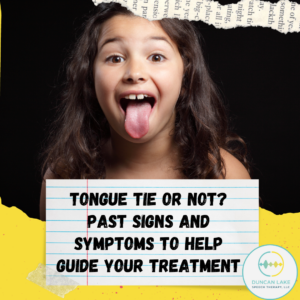Written by Tamiko Teshima, M.A, CCC-SLP
Duncan Lake Speech Therapy, LLC
It seems like tongue ties are one of those things that swing back and forth like a pendulum – for a decade or so, they are identified, and then for a decade, the identification fades away. This happens with many disciplines in the healthcare world. However, as a speech-pathologist, tongue tie identification can be very helpful for the remediation of many speech sound errors and swallowing difficulties.
How can a tongue tie impact speech and swallowing?
Spend a few moments talking to yourself (say anything, literally anything!). Notice how much your tongue moves around your mouth. Now imagine that your tongue is tethered to the bottom of your mouth by a piece of skin. How might that change the way you speak?
Without the full range of motion of the tongue, our “speech helpers” can’t connect. This means that speech sound errors can occur. Additionally, having the tongue tied down to the bottom of the mouth means that the tongue sits low in the mouth. A typical tongue sits up on the palate at rest. With the tongue in an improper position, it is more likely that the tongue will stick out of the mouth, creating a lisp. Plus, the tongue isn’t able to use its muscles the way it is meant to use them, meaning that weakness can occur…which means speech sound errors can occur.
Not only does a tongue tie impact speech, but also swallowing! That little piece of attached skin causes all sorts of problems, huh? If the tongue is tied to the bottom of the mouth, it isn’t able to sweep food to the back of the mouth to be swallowed appropriately. This can lead to things like gassiness (lots of burping), acid reflux, and intestinal issues.

How do I know if my child has a tongue tie?
To be honest, unless you have it checked out by a professional that sees tongue ties on a regular basis, it’s kind of hard to tell. However, think back to when your child was young. Do any of these signs or symptoms sound like them?
- Difficulty breastfeeding as a baby
- Painful breastfeeding and/or low breastmilk supply
- Extremely fussy as a baby; difficulty with sleep schedule more than a typical baby
- Projectile vomiting as a baby
- Difficulty gaining weight as a baby
- Choking/gagging on foods upon introduction
If you have a baby and are concerned that they may have a tongue tie, we recommend reading this blog post written by our friend Kelly Pahman of Craniosacral Center of Grand Rapids.
Even now, as an older child, do any of these signs or symptoms apply?
- Snoring, flailing, sleep talking, or bed wetting during sleep
- Open mouth posture/open mouth breathing
- Picky eating
- Tiredness/the appearance of being tired (dark circles under eyes)
- Attention difficulties
- Dentist recommendation to go see an orthodontist
- Continued difficulty with speech sounds, especially /r/, /l/, /s/, “ch”, “sh”, and “j” despite lots of intervention
Ok, they have a lot of these symptoms. Now what?
Luckily, here at Duncan Lake Speech Therapy, we treat orofacial myofunctional disorders, or disorders of the structure and function of the oral cavity (like tongue ties). We can put you in touch with the appropriate providers!
Even if you don’t come to us here at DLST, there are plenty of folks around that treat myofunctional disorders. The key is to find one that understands these disorders and has training in this area.





I like that you talked about how tongue tie could also impact swallowing, not just speech. I was talking with my friend yesterday and I heard that he suspects that his son has a tongue tie. Fortunately, there are tongue tie procedures now, so they should probably look into that.